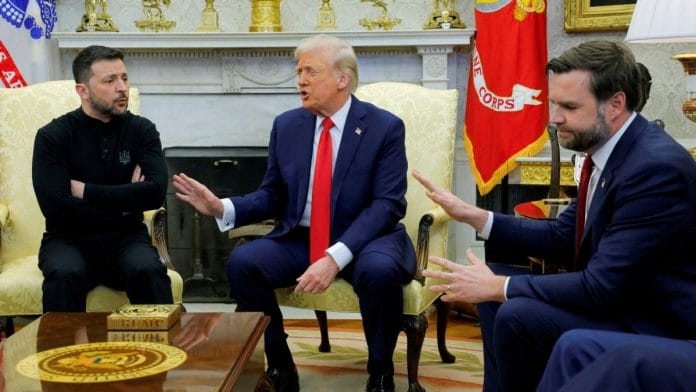Last Friday, the Oval Office provided an unusual stage for diplomatic theatre that stunned audiences around the world. The live telecast of the unscripted exchange between Ukrainian President Volodymyr Zelenskyy, a former comedian and US President Donald Trump, a former reality TV star, with JD Vance playing a supporting role, has become the stuff of diplomatic legend, with reactions ranging from applause and awe to shock and horror.
Perhaps, there was a hint of what was to come when Trump remarked “Oh, you are all dressed up,” as he welcomed Zelenskyy to the White House. Or in an early question by a reporter about why he wasn’t wearing a suit in “United States’ highest office?” But if so, it didn’t register with Zelenskyy. When Vance praised Trump’s efforts at diplomacy and Zelenskyy questioned it, Vance belligerently accused him of being “disrespectful” instead of “thanking the president”. Zelenskyy remonstrated but Trump intervened, telling him that he didn’t “have the cards” and blamed him for “gambling with World War III.” Minutes later, Trump ordered the media to leave but added that “This [their spat] is going to be great television.”
Since then, the signalling has continued through media and X. On 1 March, Trump said that “Zelenskyy is not ready for peace”. The following day, Zelenskyy, said after his London meeting, that a peace deal is “still very very far away” angering Trump, who responded that “America will not put up with this for longer.” On 3 March, the US announced that it was pausing all aid to Ukraine, even as European leaders were finding ways to repair the damage. Meanwhile, on Saturday, Elon Musk quote-tweeted “I agree” to a post from someone who wrote, “It’s time to leave NATO and the UN.”
Political leaders make use of media, including social media, for signalling to different audiences, both at home and abroad. But there is a good reason why diplomatic discussions and negotiations are conducted in camera. It permits the parties concerned to protect the image of the leaders, allow diplomatic summitry to maintain the aura of gravitas, and control the narrative. The Trump-Zelenskyy encounter is an example of how both sides lost control of the plot.
Some policy analysts feel that US outreach to Putin is to dilute the Russia-China bond, reminiscent of the 1971 Kissinger visit to China to divide the Communist bloc. But the parallel is misplaced. In 1971, cracks were visible in the China-Soviet relationship. And second, the US was not creating a divide within the Western bloc.
Also read: From rule of bureaucracy to rule of democracy: lessons from America
The substance of US diplomacy
Zelenskyy knew that he held the weaker hand. Had he kept it in mind in the Oval Office, he could have sidestepped the provocation. Trump and Vance revel in the in-your-face approach, both domestically and with other leaders. However, exposing a growing US-Europe divide on Ukraine and other issues only weakens the US hand by giving comfort to Putin and Xi Jinping.
Realism has always been an integral part of diplomacy. Political leaders, whether democrats or autocrats, instinctively know that idealism is not the strategy for survival. Writing in the fourth century B.C., Greek historian Thucydides described the powerful Athenian delegation bluntly informing the weaker Melians, “The strong do what they can and the weak suffer what they must.” Closer home, Kautilya elaborated on how diplomacy and persuasion can amplify the effectiveness of power in the Arthashastra.
US presidents have never been idealists. Even President Theodore Roosevelt, the key architect of the United Nations, was clear that the real power would be exercised by the Security Council and within that, by the Permanent Members who enjoy veto powers. At the same time, he also realised that the principle of equality of sovereign states had to be respected to get a buy-in by all countries and so the General Assembly became the premier annual gathering. And this is when the US accounted for 50 per cent of global GDP!
Nixon extricated the US from Vietnam but needed the fig leaf of the Paris Peace Accords negotiated in 1973. Just as Biden used the agreement Trump had concluded with the Taliban to engineer the US exit from Afghanistan. Both were guided by realism but needed the diplomatic cover. During the Cold War, successive US presidents supported military dictatorships in pursuit of realism but couched it as a defence of democracy and the free world. Yet, when faced with the Soviet crackdowns in Hungary in 1956 or Czechoslovakia in 1968, the value-based diplomacy quickly yielded to realist prudence.
Therefore, Trumpian diplomacy is not a departure from US diplomatic practice in substance: its change is more in Trump’s style of diplomacy. He may desire to Make America Great Again but he presides over an America that no longer enjoys the primacy it enjoyed in 1945 or 1991. Though President Roosevelt’s advice “speak softly and carry a big stick” was given at the beginning of the 20th century, before the age of TV and social media, it remains valid. As President Abraham Lincoln famously said, “You can fool all the people some of the time, and some of the people all the time, but you cannot fool all the people all the time.” Trump would do well to heed the advice of his predecessors and not be seduced by his own voice on Truth Social.
Rakesh Sood is a retired diplomat who has served as Ambassador to Afghanistan, Nepal and France. He also served as India’s first Ambassador – Permanent Representative to the Conference on Disarmament at the United Nations in Geneva and later as PM’s Special Envoy for Disarmament and Nonproliferation. He tweets @rakeshnms. Views are personal.
(Edited by Theres Sudeep)







The megalonaniacs like Trump and Modi hardly change, such leaders are so full of themselves.